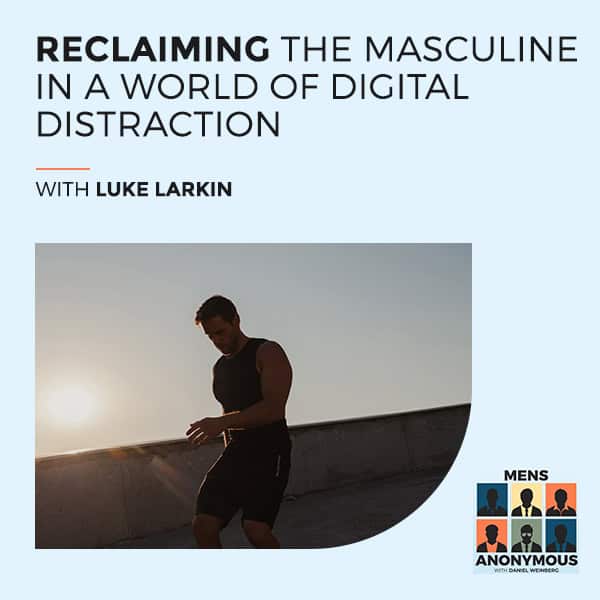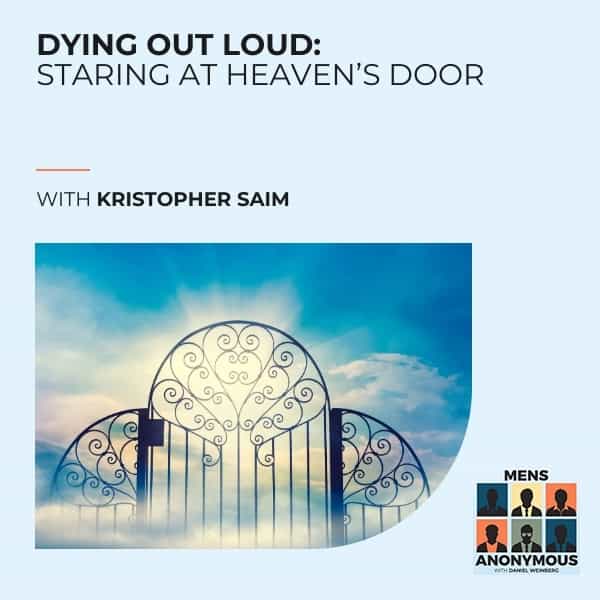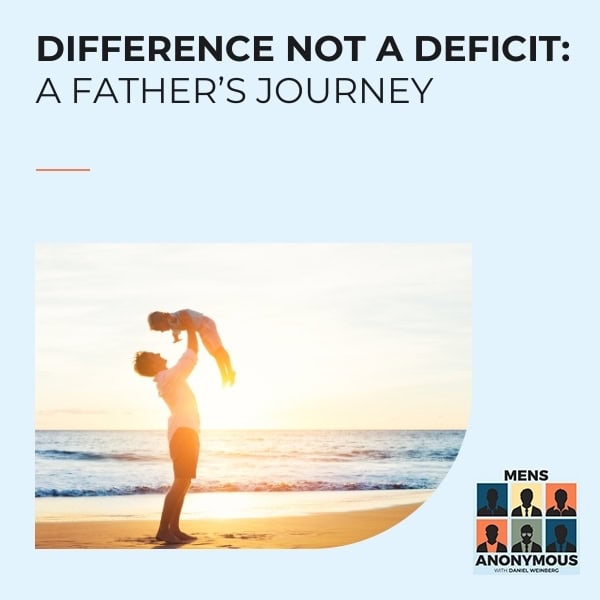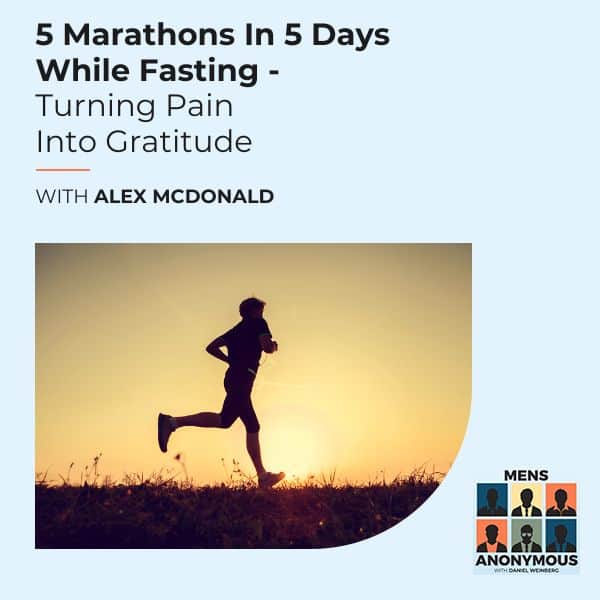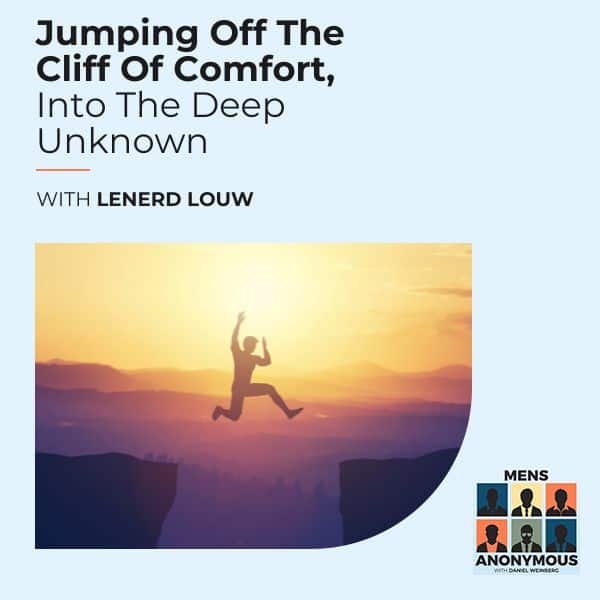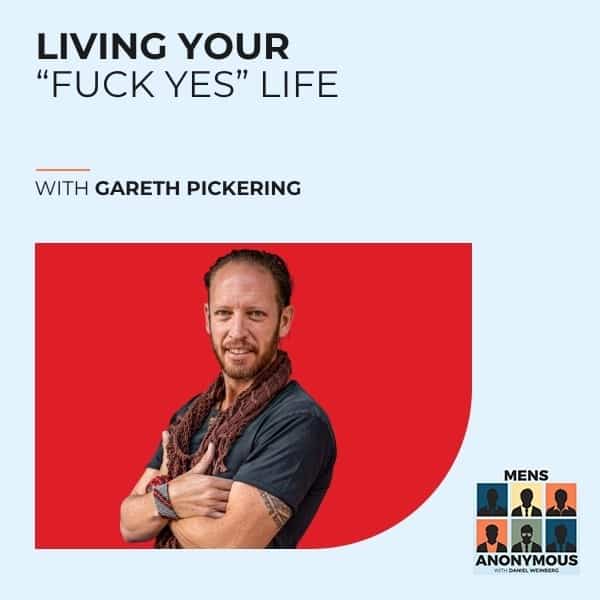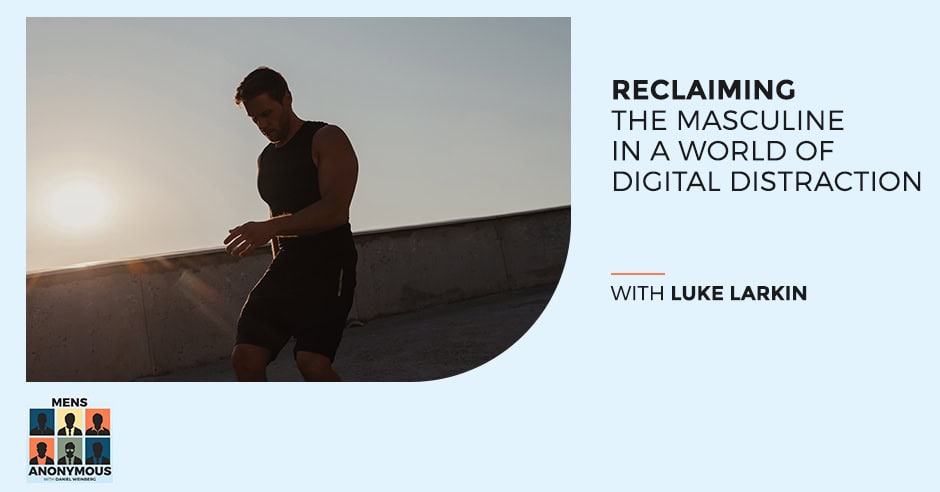
Is the internet keeping us constantly connected or is it actually making us more isolated? Recovery coach Luke Larkin joins Daniel Weinberg in this eye-opening discussion about addressing the endless list of digital distractions that may be eating away our lives. They delve into the dangers of getting addicted to online dating and pornography, which can destroy your relationships and trap you in the illusion of living a happy life. Luke also shares the most valuable lessons from his own battle with online addiction, how he overcame them after seven years of clinical recovery, and how he uses AI tools to help struggling individuals reclaim the best version of themselves.
—
Watch the episode here
Listen to the podcast here
Luke Larkin: Reclaiming The Masculine In A World Of Digital Distraction
In this episode, we have Luke Larkin, who gives us a deep insight into the world of digital addiction, sex addiction, digital dating, etc. I’m very excited for this episode. Luke, welcome to the show. It’s great to have you here.
Daniel, thank you for having me. I’m happy to be here.
We’ve been discussing this episode for a little while. I’m so glad that we’re doing it. Where are you in the world?
I’m in Boise, Idaho right now.
Don lives in Idaho as well, is that correct?
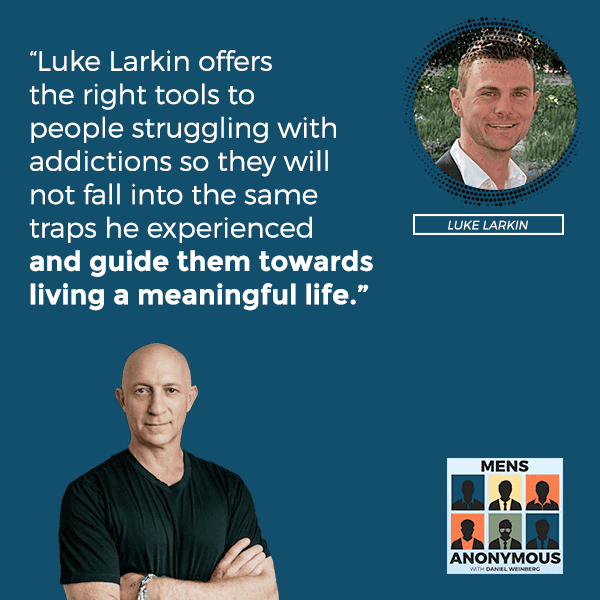
Yes, Don is one of my best friends.
We had another previous guest from Idaho. I’ve never been there. In this episode, we’re going to be deep diving on the world of the digital relationship world, let’s say, the world of digital compulsion and addiction. It’s an honor and a quite an opportunity to be able to speak to someone who’s had quite a lot of not only firsthand experience, but has been through the rollercoaster, the peaks and troughs of this world. I’m looking forward to you sharing that experience.
Founder, Writer, And Recovery Coach Luke Larkin
Most importantly, you have gone into a journey of losing control and regaining back control. I really want to talk about as well what you are doing now in the space where you are educating and giving people tools, especially young folks, which are mostly affected on how to manage those compulsions and addictions so that they don’t fall into the same traps that you’ve either experienced or observed. Why don’t you give us a little wrap on where you grew up and we’ll kick off the journey?
I grew up in Pittsburgh, Pennsylvania. I moved out West to Utah, and I’ve been in Idaho. I’ve worked in addiction recovery primarily with substance abuse for over seven years. CBT, 12-step, dialectical behavioral therapy. I facilitated it and I’ve watched it firsthand. As you mentioned earlier, I’ve had my own journey through addiction. Mine wasn’t necessarily substances per se, it was more getting lost in the digital world.
I’m just grateful for the opportunity to get to talk about it and hope that people who hear this and it resonates know that they’re not alone. I think what’s probably been one of the most profound impacts for me is just shifting from a very self-centered mindset or this core belief that I am the center of the universe. Being able to zoom out and understand that not only am I not the center of the universe, but my story, pain and experience can actually be like a powerful tool for others. I’m grateful for the opportunity to share that.
The Ever-Evolving Online Landscape
I did not grow up really in the world of digital. I grew up in the analog world. Around the time I was in university and post-uni, like the post-college days, was the beginning of the internet. Mobile phones, they weren’t smart phones back in the day. There were the Ericsson, Nokias, Motorolas, that vibe that really only started in I would say early college to early working.
When I traveled after college and took a gap year, I took a gap year after finishing college, it was payphones, reverse charges to your parents, wanting to speak to them. When you are even meeting up with people, it wasn’t, “Let me text them and we will find them.” It was like, “No, we’re going to meet at that point and when we get there, wait for me. Don’t go anywhere. I’ll come.” It was very much like that.
I also married the first time in 2004. Fast forward, it’s the first internet boom and crash period. It was all about the internet. I think smartphones only came around 2006 or ’07, something like that when I think iphone came out. I never, ever really experienced firsthand, for example, digital dating, Tinder. I know Tinder, Hinge or Bumble. I think I invested in a couple of them.
I definitely invested things but never really experienced it. I got divorced, married again, didn’t have the experience. Even after that whole round of being divorced the second time around, I never ever really got into the digital dating scene. That’s on that front. When it came to, let’s call it pornography, I grew up with magazines.
Playboy, Penthouse, Hustler. There were the VHS tapes of the ones you’d find in your parents’ drawers or if you go to the video shop, there’s the room in the back where there might be some R-rated and X-rated, but that’s about it. When you travel to Europe and you traveled to Europe and you turn on the TV in hotel room, they had the channels where they had full nudity, but not in the US.
When I started working, it was the internet hype. You had email, so people would start sending through, literally, pdfs of just static images and then you started having video come through. Fast forward maybe mid-2000s, then you started getting YouPorn, Pornhub. You had all that stuff started really percolating because you had faster bandwidth, etc.
I’ve seen that journey and you see how the availability and proliferation, there’s so much to choose from and the content that’s available just went crazy. In our discussions, you mentioned OnlyFans, which I have heard of before. I have no clue. A lot of the audience, I’m sure, is aware of what OnlyFans. I have no clue about what OnlyFans is and the business model behind it or how it actually works.
I’m going to get you to explain a lot of this stuff and how people get caught, but all of it culminates into for the user and what I see even with my kids, just with things like TikTok and Snapchat and all, is this behavior of what I’ve heard coined to be things like doom scrolling. The point is that it’s unlimited. It’s almost unlimited to infinitum so that there isn’t the time in the day to see everything that’s available. You could sit there for weeks on end and you would just see unlimited new content coming through. The user is being swarmed by a tsunami of content, of which it’s almost impossible to manage without putting controls in place.
I’m not just talking about porn addiction or dating like the digital scrolling. The children that we have nowadays are being wired from a very early age into the behavior. You grew up in a period where you and your generation and below have been wired over time into this is how we interact, this is how we behave, this is how we consume content, etc. As much as the old father or grandfather say this is what I call brain rot. I’ll tell my kids, “This is rotting your brain. This is brain rot. This is destroying you.”
It’s very difficult for them to understand what I’m trying to tell them, which is fair enough because it’s all they know. It’s what all their friends and peers do. It’s what they see around them. You are asking people to engage with technology for education purposes, for employment purposes, not just education, but also just learning that’s how you access information. Everything’s being blurred.
Meeting people online is a fractured experience. You are only seeing an image of a person that they have curated through filters, lighting, and AI prompts. Share on XWhat I want to hear from you is that the journey of what it’s like to date on Tinder and all the other platforms you can maybe explain. I had a guest on the show, Greg Sutton, who is a therapist who focuses on the area of sex addiction. We have spoken a lot, but that’s from a therapist’s perspective. Also, he gave some anecdotal stories around maybe some more extreme cases just to highlight where it can go.
I think what I’d like to hear from you and take this opportunity is for you to walk us through what you are experiencing, how you’re experiencing with the other. The women you are dating, how they respond, how the actual interaction works, why it takes away from the actual social romantic connection. I want you to talk me through the OnlyFans, how that works, why one gets addicted to it.
You can touch on the porn story as well and what you experienced and what you understand other men, I’m going to assume, have experienced more than women, but I’m sure women also do participate. They’re obviously curious. They also have their own sexual needs that they need to be satisfied. It all ties into where relationships are going these days as well.
You see birth rates across the world plummeting in some countries. In places like Korea, it’s actually less than one now. If you look at, just mathematically speaking, when populations go below one, over time, those populations are going to inverse, meaning the pyramid’s going to have old people, young people and it eventually dies out. People don’t really understand that because they’re living in today’s world and can’t really think of what it’s going to be like in 100 years’ time. That’s effectively what’s going to happen.
Today’s Online Dating Landscape
I’ll pause there and let’s start with digital dating and how that works and what’s going through your head? What’s dopamine, serotonin that’s being released? The doom scrolling, the actual engaging and meeting people on that basis without having true connection, what those experiences are like, etc.? Let’s kick off there.
We’re so far away from when the first caveman etched a stick figure of a woman with boobs. 4K video, streaming services, Wi-Fi everywhere, Starlink, it’s constant and it’s always available. You’re describing as a father, watching your kids grow up in this digital world, it’s overwhelming. I imagine it’s quite disconcerting to see people you love like immersed in it and not even be aware of how prevalent it is because that’s their baseline.
Growing up at the time I did, it was interesting because I grew up with VHS tapes. We would record the Olympics on a VHS so we could watch it the next night. Going from that to high-speed internet and like you’re saying, just this massive boom in the early 2000s, that’s only increased dramatically. I would say if we’re going to dive into dating, especially now, I think it’s hard to do so without bringing up COVID, the pandemic.
Things like organic connection or meeting at coffee shops or bars or running clubs, for example, people got pushed into our homes and our lives became more and more online. Especially for dating, those opportunities for those chance encounters at places that you would normally frequent really diminished. With that, even now, you’re seeing this proliferation of these dating apps, which you mentioned, Tinder, Hinge, Bumble, etc., where that’s now become the norm of how you meet a partner.
One quote that comes to mind, “Excellence is not one random act of heroics. Excellence is what you repeatedly do. It’s a habit.” I can only speak from my own personal experience, but when you’re making snap judgments about people on a screen with a thumb swipe, to be brutally honest, we’re looking at like 1.2 seconds of judging. The opportunity cost to read every single person’s profile and look at every single picture and do so intentionally or consciously, is it’s just not incentivized.
Basically, what you are saying is the opportunity for a woman to be met by you using that application, she’s got about one to one and a half seconds opportunity to make the impression on you such that you’ll decide to tell her that you’re going to give her the swipe, which is a like or something. She knows you actually found her remotely interesting. You’re not 100%. You’re actually reading and saying, “She’s into running. I love running too.” Nothing like that. It is completely surface area, the image that you see, move on.
You mentioned several of the dating apps, and that’s a testament to the user design that more and more dating apps that are coming out. Hinge is a great example where they really do their best to de-incentivize compulsive swiping where it’s not just a thumb swipe, but you have to pick something about someone’s profile and like it.
Tinder is very swipe left, swipe right. It’s a very simple design pattern to hopefully bring more consciousness or more intention to the dating world. I think, again, it’s what are you looking for? How much energy are you willing to put into it? Ultimately, how are you going to condition yourself? What are the tools, what are the patterns that you’re going to engage in? Are you even going to be conscious of them? You’re saying, even with your children, you’re not really seeing that. It’s just inherent, it’s compulsive, it’s mindless.
I am a technologist. I’m grateful we can even have this conversation across the Atlantic Ocean. The opportunities that technology has allowed us are just massive, immeasurable even, and I’m very grateful for that. With that being said, there are a lot of traps or digital sirens, if you will, that are constantly available that I don’t really think get the attention that they deserve. I think looking at digital addictions and how prevalent they become is not just important, but it’s really become my core life’s work.
Let’s go back into the process. You like the other, she ends up, “I also the look of you.” She’s also done the swiping or she’s received a message that said, “You’ve received a like.” Do you like back? Explain the process of actually what happens when you are meeting someone in this type of framework.
I think there’s a lot of different options or directions that it can go. Digital flirting versus standing in front of somebody at a coffee shop, for example, is radically different. Whether it’s gambling, gaming, porn, online shopping, one of the reasons it’s so pervasive is there is a degree of anonymity to it. Even on Twitter, you see these people in these hateful screaming matches into the void where they’re talking to a phone, punching their thumbs onto a black screen.
A woman with a long-term partner on Tinder is like a blind woman going in for a hearing aid. Share on XWhen you’re stand in front of somebody and you know they have a completely different worldview than you and you engage in a conversation or a debate even, that’s so radically different than what we’re seeing. I would say the same is true for dating, where the traditional courting process, I would say a lot of the steps are being skipped.
Not to say that we need to go back to a Victorian white knight thing at all, but the opportunity to truly get to know a person while you’re meeting them online is fractured. You’re seeing an image of them that they have curated through filters, lighting. Even leveraging AI to find prompts or compelling about me sections for a profile, you are interfacing with that directly.
Really getting down to who somebody is at their core essence, what their life goals are, what their core values are. Are they in alignment with yours? Do they have a lifestyle that is in line with, or at least consistent with yours? These are things that I think get swept under the rug quite a bit. It’s very easy to fall into a pattern where it’s like, “Nice to meet you.” We flirt. You pick a time or a place, you grab drinks, you go on a walk. You’re already pre-vetted. There’s no real vulnerability.
Whereas if you approach a woman at a bar, you’re vulnerable. They don’t know who you are except for the split 3 to 4 seconds of you introducing yourself. So much information is being conveyed in person. We talk about 70% of communication is nonverbal, but the difference between punctuation and emojis on a dating app versus somebody standing right in front of you and making a bid towards you, conveying interest or at least conveying some playfulness or flirtations, it’s radically different.
I think what we’re seeing is those natural skills in person or atrophying because they’re not being reinforced. There’s a lot of dopamine and a lot of validation behind getting likes and it doesn’t take that much effort. You’re getting dopamine spikes without the vulnerability and then you’re seeing a lot of people who might get high on it and it might be a nice crutch. It certainly was for me.
Getting Addicted With Online Dating’s Dopamine Hits
Explain what that means, the dopamine hit that you’re getting. Explain where are you getting the dopamine hit. I’m just going to go to try and paint a picture. You are going to guide me whether I’m going in the right direction here. Let’s talk about the dating stuff. You are connected to multiple apps. Let’s say you signed up to a few apps, not one. I’m going to assume that.
You are going to be interacting with multiple women at any one time. You might have, let’s call it five that have responded to you this week. They spend some time and you are messaging five of them at different parts of the day, doing the digital flirting. I’m assuming that person, Woman A is doing the same thing with five other guys as well on the go.
Probably 50.
Basically, what’s happening is both the man and the woman are trading options. They call it horse trading. They’re literally just backing multiple horses at the race course. They’re just seeing what they can get out of each of them. It’s almost like playing one off the other. They don’t really know them because they haven’t really met most of them. It’s literally just, “What are you doing?” Very small chat. No one’s getting into deep, but how do you feel about the current situation in Russia and Ukraine? There’s no deep conversations going on around like, “Tell me about your childhood.” That’s not really happening.
It’s very surface level chat. This is what I’m trying to understand. The ultimate end game being multifaceted here. What are they trying to achieve? What was the man and woman trying to achieve? You’ve just highlighted one of the things they’re trying to achieve is the likes, the attention, the dopamine.
Validation.
The validation. There’s that. There also must be some motivation to have a sexual experience as an outcome. Very much void of deep connection or emotion. It’s very much a release, let’s say a sexual release.
It certainly can be. I think a lot of that is the intention you bring. One thing that is radical and wild in coaching men that I’ve witnessed third person is how differently we behave on different online platforms. Nothing’s changing necessarily. You’re still on the same phone, you’re still on the same laptop, but how people perform or behave on TikTok versus Facebook is fascinating.
I would say the same is true for dating apps where even the pictures you choose to curate on Tinder versus Hinge are radically different. These narratives that you’re creating, they’re all coming out in different directions, different angles, and then different people are responding to those patterns or symbols. I think especially things Tinder, among other apps, it really does reward hedonism.
It’s a hookup app as opposed to this is going to go further and we become exclusive. That can happen. In general, it’s just horse trading on an app to have physical experiences or have perpetual flirting, digital flirting experiences where you just keep feeding each other the dopamine hit without the physical experience even.
I would say when you see a woman on Tinder with long-term partners, her goal, it’s like a blind woman going in for a hearing aid. She’s looking for the wrong thing in the wrong place.
Subscribing to OnlyFans may feel great, but it is badly affecting your bank account. Share on XYou don’t actually have a physical meet but you end up having digital sex.
That can certainly be the case. Absolutely. Full disclosure, that was definitely part of my pattern.
Tell us your pattern with regards to the apps.
With any pattern, I think it’s important not just to look at like where’s the pleasure coming from? Where’s the dopamine coming from? What’s the utility of this? What role is it serving? What pain is it numbing? What pain is it managing? For me personally, I was thirteen years old and you’re talking about different devices.
I had one of the first LG camera flip phones, one of the first phones with cameras. There was a girl from a neighboring high school and got her number and I have two amazing parents. They had a rough divorce and custody, at that point in time, it was tough for everybody. I found so much reprieve in that little flip phone of being able to message this girl whenever.
It was sexual and feeling connected, feeling validated with no vulnerability, no risk whatsoever. That was really my first exposure and I was hooked. I was like, “I love this. This is amazing.” It was a reprieve. It wasn’t just about the pleasure, but it was also about the pain or fear that it masked or allowed me to run away from. That was my own personal experience.
I think so much of the digital dating world, I know it sounds cliché, but it’s you get what you put out. The energy and intention that you bring into it is ultimately what you’re going to attract. You see a lot of broken people looking for another to fill them up, fill their cup, feel the void inside of themselves that they’re afraid to face. I think it costs them. It certainly cost me. Does that answer your question?
How The Pandemic Transformed Pornography
In a way. Let’s just keep going into explaining to me and the audience. We’ve spoken about the porn addiction before and it’s pretty obvious what a YouPorn or a Pornhub. I’m sure there’s so many of those things. Personally, I would say that growing up, I would’ve been really into porn because it was restricted. I think you’re more into it when you can’t get it.
As it became so available, I personally haven’t looked at porn in years. I’m not a big masturbator. I know that a lot of people are into it. Obviously, it’s a fucking huge industry. I think most of the audience understands porn and where that goes. I think the new age is things OnlyFans, which I’m going to get you to explain a little bit to me.
I do have one friend who obviously I’m not going to name who has ventured into, and maybe this is what OnlyFans is, where you webcam or where you are talking to someone and it’s almost like your own private digital strip girl or whatever where that’s like, “What are you going to pay me to do?” They’re engaging and it turns on the person. Let’s say it’s a private lap dance in a way. It’s a digital lap dance. Talk me through OnlyFans. What is OnlyFans?
You’re talking about certain stages of digital pleasure in general being a little bit after your time. I would have to say the same for OnlyFans. With me, we really saw OnlyFans explode during COVID. When you isolate people physically and then you give them a check and tell them to stay in their houses with Wi-Fi, it’s not rocket science to see that people will find ways to gratify themselves, seek pleasure, try to avoid pain, maybe manage the fear and anxiety of what was going on, this global pandemic.
I think it’s a really strong point you are making around this COVID period. Effectively, what you are saying, and I fully agree with you, is that period accelerated exponentially a lot of these types of things. It really pushed people into the digital world because they didn’t have the physical world available to them. I’m very aligned with you on that thinking. Tell me what happened with this OnlyFans situation.
I think what you saw is essentially the digital commodification of intimacy. Porn is ubiquitous. It’s everywhere. You can drive down a highway and see it on a billboard. It’s on Twitter, it’s on Facebook, it’s everywhere. It’s constant. It’s voyeuristic.
It’s one way. It’s just the person observing. It’s not interactive.
At least, it wasn’t at this point. Enter OnlyFans, which is this illusion of intimacy where you essentially feel connected to the person because they’re now messaging you directly. The sad truth is they’re not messaging you. There’s a bot, there’s a webcam farm in Russia or India where they’re pumping out these direct messages for these actresses.
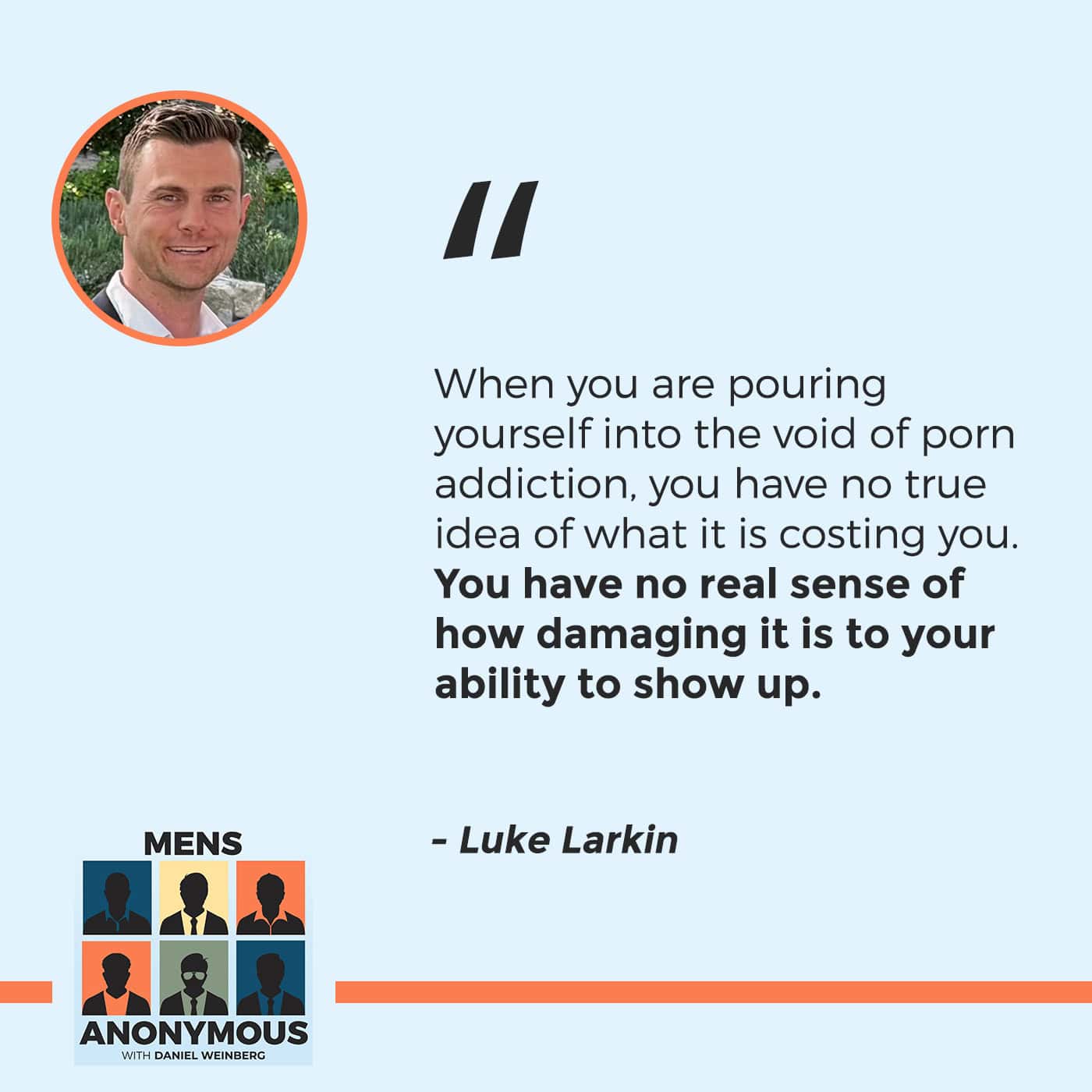
The actual conversations are outsourced. You see you have a woman who’s got OnlyFans, what is it? A space. I don’t know.
Account.
An OnlyFans account. She has contracted a third party to do the actual messaging. Effectively, talking to a computer, but men don’t really realize that that’s what they’re doing or they do and just accept it.
I think a lot of the most dangerous lies are the ones that we tell ourselves. I think any logical man, you see a certain pattern of behavior or speech and if it seems too good to be true, then it probably is. However, because of the desperation, the sense of isolation and desire for genuine connection without feeling they have the tools or the wherewithal or the courage to go and initiate it, it is a convenient lie because the lie only affects their bank accounts.
One thing I was thinking about that I find fascinating is I think people looking third party or when I work with men who are struggling with things OnlyFans, you’d say, “Yeah, I get it. It’s great.” It makes you feel good. You feel you’re connected, but it’s affecting your bank account. I would actually now, given the time that I’ve worked coaching men, the payment is part of what they’re getting out of it because while it’s been repressed or rejected by our culture, there is a profound desire from the masculine to provide.
You think they feel like they’re helping someone out.
They’re helping this beautiful princess with her twelve vibrating toys and they feel like they’re helping her.
Taking care of her.
Yeah, and that she cares about them. It’s a niche. It’s meeting a real need.
Loneliness. Very sad, don’t you think?
Yeah. It honestly makes me want to cry.
It’s sad from that perspective. It not only perpetuates the loneliness, but it takes away the muscle memory of learning how to interact with other people. What I’m hearing when you say that, it’s effectively pushing more and more people in society, particularly men, to that place of loneliness, to that place of disconnect, to that place of low interaction with other, not just the opposite sex, but also friendships, relationships, etc. It’s killing that soul, that energy. It’s pretty scary. I never really thought about that.
How Porn Addiction Destroys Relationships
It sounds like it’s all related, whether it’s the dating vector, because what I also hear in my readings and talking to lots of men, what is also happening, even men who are in relationships, long-term relationships, marriages, etc., they are still in that accessing the porn or the only fans and etc., to get that dopamine hit, to get that release.
They’re not getting it with their partner. The more they go down that path also makes for a very unhealthy relationship with their partner. It can start off like, “It’s keeping things spicy,” or whatever. When it becomes another addiction, it’s a loss of control and it’s actually negatively affecting their relationship.
You beautifully highlighted how it damages our primary relationships with the people around us. I would go a step further to say that the biggest harm is to your relationship with yourself. You’re no longer just performing or paying or trying to chameleon your way into somebody else’s life in order to get validated. Essentially, you’re hiding from your own life’s purpose. You’re hiding from your own hero’s story. You’re finding a quick way to blunt yourself, to gratify yourself, to distract yourself from the things that you’re truly afraid of.
I would say the absence of a genuine hero’s story is what I see that I think is probably the most prevalent issue because when you have meaning and you have purpose, and you have a why, these things start to lose their appeal. They start to lose their luster. When you create a life that’s so vibrant, so meaningful and rich, you don’t need Pornhub, you don’t need OnlyFans, you don’t need Tinder.
There is an immense cost to looking for love in another person online. Share on XIf you are afraid or you’re paralyzed by that, it’s a very compulsive and compelling crutch because it shields you in a way. It helps you hide. I think it’s affecting not just romantic relationships or how people show up in dating, but really how we show up for ourselves and just grateful for the opportunity to talk about it so that other people can hear it because it’s real.
I’ve got a couple of questions which I’d love to hear. When you were going through this and you were in assuming you had serious relationships in this period as well, did you find when you were in those relationships, did it help you stop the compulsions and addictions or were you doing it in parallel at the same time?
Without getting too graphic.
I don’t want graphic. I want hear around the did you manage to have self-control or you still did not have self-control?
No. What ended up happening for me or my pattern who I was online and who I was in real life were two different people.
You mean there was Luke and Luke’s alter ego.
Yeah, essentially. Very d Dr. Jekyll, Mr. Hyde trope where I show up and present in one way in the real world and then this anonymous persona or attitude. It’s radically different. When I look at that version of myself, I have a lot of compassion for that person. It brings on a lot of humility because I see 2 versions of 1 person both desperately trying to receive love and refusing to, or feeling unable to offer that love to themselves. Looking for love in another person, whether they’re online halfway across the world or on a dating app, there’s just immense cost to it. The energy that it takes from you and your ability to show up for the people who are right in front of you is completely diminished. It hollows you out.
How much does it affect your other relationships, friends, family, work? How much did it actually impact the other parts of your life? How consuming was it?
I would say that in the throes of it, I wasn’t even close to aware of what it was costing me and my other relationships. In fact, I would say there was an awful lot of denial interlaced into it where it’s like I’m still doing great at work, I’m still producing at work, I’m still performing. I’m still a good friend. When you’re pouring yourself into this void, you have no true idea of what it’s costing you and no real sense of how damaging it is in your ability to show up as your loving full self for the people that you love.
Quite honestly, in my own experience, it wasn’t really until I started to see how the people who loved me the most started to pull back because of how empty I was and how they continued to watch me essentially harm myself. It really woke me up to the idea of like, “I’m going to lose the people who love me the most because I’ve put this above everything.” I’ve made this into, in a way, like my god. I’ve worshiped this. Having people who care enough to be like, “I’m going to have to radically change how I connect myself emotionally to your life because of your insistence on hurting yourself because now it’s hurting me.” Those are the words that my best friend said.
What was it that that triggered them to come and say that to you?
Two years ago, I was in a super unhealthy, codependent relationship. Just very reactive, dysregulated. There’s this quotes like, show me an unhealthy relationship and I’ll show you two unhealthy people. That was absolutely the case. Despite knowing that it was bad for me, despite knowing that it wasn’t in alignment, it didn’t help me become closer to who I want to be, I continued to go back over and over again.
It got to a point where I was on the phone with my best friend and he was just sick of hearing about it. He was sick of offering the same advice and me nodding my head and then doing the complete opposite. That’s when he said, he’s like, “I can’t continue to watch this. Your insistence on continuing to hurt yourself is now hurting me, and I’m going to have to change how I connect myself emotionally to your life because this is incredibly painful.” It was like a switch went off where I was like, “Fuck.”
Using AI Tools To Combat Addiction
He’s the one that gave you the gift. Let’s fast forward to now because as difficult as your past was, and it has been to talk about, because we’ve been speaking a little while and I can see how deeply personal this is and I’m sure there’s a lot of shame, disappointment in yourself or whatever, but we’re not talking about the past.
I want to talk about now in the future, because you have taken all that negative energy and you have transitioned all of it into something hyper positive, which is, “I’m going to take all my learnings and my experiences and my exposure from the social work you’ve been doing, etc.,” and you are working with men. I want you to tell us what are you doing now and where are you taking it? I’d like to really finish off with this is all for a positive outcome at the end of the day here. Not only a positive outcome, but also something that’s going to have a lot of impact on multiple people. You’re going to lift people, not just one, not just yourself, but many others. Talk us through that.
If you cannot get focused or you are feeling scattered, it is amazing how 30 seconds of intentional breathing can make you feel better. Share on XNow I’m the CEO and founder of TARU. We’re building AI tools to help people redefine their relationship with technology, specifically focused around compulsive behavioral addictions gambling, gaming, porn, online shopping, really any digital compulsion. I work one-on-one with men through coaching and help them to reconnect to themselves. That’s been truly just one of the most rewarding experiences in my entire life. Our opportunity to also leverage this AI revolution to help people form a more conscious relationship with technology has just been amazing. We have an app that’ll be launched at the end of August 2025. We’re just trying to give people the tools that I wish I had when I was 22.
Can you walk us through some of the actual tools, the practices, the AI tool is going to implement these things? I want you to try and help the audience understand what are actually some of the tools that they can take away by you just describing them of what they can do that can help them be more in control and return to more self-love, etc. Talk us through specifically around the digital addiction, some of the tools that, that you are enabling and promoting.
It’s almost stupidly simple and obvious in our research. The clinical research that’s coming out, things that are as simple and stupid as step counts throughout a day are actually incredibly telling about where somebody’s at in terms of their digital behavior.
Tell me what’s a step plan?
You have a phone and say you go on a four mile walk and it’s like you have 9,000 steps. I think a lot of this is because we are so sedentary because we can be mesmerized by these beautiful dynamic colors on a screen. We’re so far from being hunter gatherers, but even just walking down the sidewalk, that energy has nowhere to go. You see this huge spike in what people are calling anxiety and you have hyper and hypo arousal where the energy isn’t able to move through the person.
What’s hypo and hypo arousal?
It’s just essentially terms around being overly activated and under activated. An example would be like, something I’m seeing a lot with men is like, they’ll use three 9 milligram nicotine pouches, drink 400 milligrams of caffeine, sit in front of their computer and try to work. They’re like, “I just can’t stop watching porn.” It’s like, okay, you’re putting rocket fuel into your body with a Wi-Fi connection in a locked room and hoping for the best.
Let’s dumb it down. Let’s get super simple. How much are you moving? How much are you walking? How much time are you spending outside? Are you getting direct sunlight? I know that’s so simple. Another tool that I found to be unbelievably helpful and witnessed it be helpful for men as well is I know there’s the mindfulness movement.
Everyone’s like, “You’ve got to meditate, just meditate.” One small tip or trick that you can do within 30 seconds is alternate nostril breathing. You do six seconds in through one nostril, you hold it. You would hold your thumb like this. Deep breathe in and then hold it and then switch and exhale through the other one.
How long do you hold for?
One to three seconds is fine, but if you do that for five rounds and you’re in a state of peak craving or you’re in euphoric recall or just cannot get focused or you feel scattered, it’s amazing what 30 seconds of intentional breathing can do. That’s just one of many different exercises. Part of the digital tools that we’re developing are doing our best to connect people to those exercises in real time when they need them most.
What about the ability to restrict oneself the access? Is that a reality? Do you think people can really do that or that’s too hard to give an addict, “Here’s unlimited Wi-Fi and unlimited porn. Just make sure you only do an hour a day on with the Wi-Fi.” It’s not really realistic. Here’s a bag of cocaine to a drug addict and say, “One line only.” It’s just not possible.
That really hits at the core of addiction. One drink is never enough, one bump is never enough, one click or scroll is never enough. Really quick, what I would just want to highlight that’s happening is you’re experiencing this massive spike in dopamine and our bodies, which are beautiful and they’re brilliantly designed. For something with sex, for example, after you orgasm, oxytocin and serotonin are supposed to surge after the fact. That’s where the emotional bonding after the dopamine spike occurs.
With things porn or even online sex or OnlyFans or camming, you’re not getting that serotonin or oxytocin. The need to increase the dopamine skyrockets exponentially because you’re now making up for a deficit in these other processes that you’re essentially hijacking for hedonism. I think that’s another core part of it.
One thing in terms of digital access, I think there is utility in creating blocks or friction to make it less immediately accessible, particularly when somebody’s brand new, to doing their best to redefine their relationship with technology. I’ll say from personal experience and from working with hundreds of men, it’s not enough. Any guy can disable a blocker find a different Wi-Fi source, a different device.
What you consume through your ears, eyes, and mouth will ultimately affect how you show up and what you can produce. Share on XThey’re not children, basically. A parental lock is happening. It’s not going to happen.
It could be helpful initially, but it’s certainly not a cure, that’s for sure.
Is Porn Addiction Getting Out Of Control?
I don’t want to be extreme, but given your exposure to the many men that you’ve been dealing with, are we talking about is this a pandemic? Is this something that’s just growing out of control or it’s just at a level where it exists? This type of addiction doesn’t seem to be placed in the same category as drug addiction, alcoholism. Being an addicted to alcohol or prescription drugs, it doesn’t seem to have the same, let’s say, reputation. It’s almost it’s not really being spoken about and it’s acceptable in a way because it’s hidden. Are you seeing it get a lot worse or you’re just seeing it’s it is growing mushrooms or is it contained? How do you see it?
I think it’s actually really beautiful. It’s becoming such an issue and such a problem that we’re finally being forced to address it. If you look at the social taboo around Alcoholics Anonymous when it was founded, nobody wanted to be connected to that. Now you hear about somebody being five years sober and they’re a fucking hero.
That’s almost a century of work and time and our culture learning how to integrate these different recovery processes because if you tell somebody like, “I used to be addicted to opiates,” we’ve seen the documentaries. We hear about the pain pill factories. It’s like, “I understand that. You’ve been sober from heroin for three years, that’s amazing.” You tell someone like, “I used to be a degenerate gambler and helplessly addicted to porn.” And people are like, “That’s fucking gross.”
The only way to really come out of the darkness is to bring light to it. The more you can normalize talking about it and what you’re seeing, I think actually on a major mainstream scale is we’ve ignored it for so long and it’s so in our face that we literally can’t help but finally now address it. I look at the podcasts ad reads for some of the most popular podcasts in the world, particularly the ones marketed towards men and what are they selling us? They’re selling us nicotine, they’re selling us dick pills and gum and they’re selling us sports betting. It’s like, “Your dick doesn’t work because you watch so much porn. You need dopamine from nicotine or caffeine.” Even like, “You have ADHD. Fill out a form, get some Adderall.”
We’ve used a lot of crutches to try to address the problem and it’s created certain markets, but people are finding that they’re simply Band-Aids and I’m really excited and grateful for that because now we have this amazing opportunity to reconnect to ourselves and then reconnect to our purpose in a way that we otherwise wouldn’t. Without the pain of that void, of that hollowness, of that brokenness, you would never really be able to return fully to yourself. That’s where I think we’re headed and I’m excited and grateful to be a part of it.
Luke, it’s been an absolute pleasure talking to you. I really appreciate it. I know we’ve had a few conversations and I know it takes a lot of courage to make yourself vulnerable publicly, really, to be able to tell your story. I think deep down inside and given the work you’re doing, you know that it’s going to be a net positive, it’s going to help others.
Get In Touch With Luke
You’ve really come so far in your journey, so you must be very proud of yourself and it’s just so beautiful to see a man reconnect and fall back in love with himself, which is at the core. Until one can really fall in love with themselves, you’re not going to really be able to love others. It’s really touching and beautiful to see that and get to know you. I love the work that you’re doing. What’s the name of the app so that the audience will hear and hopefully follow it and have a look at it, review it, use it?
Right now, we have a live coaching service called Untethered. If you go to Untethered.Voyage, you can get set up and connected. We have a free 30-minute call. No risk or commitment. This is something you’re struggling with or you’re interested in learning more or somebody you love who’s dealing with this. We encourage you to reach out.
We have a Chrome extension called Heal Shield. It’s live on the Chrome extension store right now. It’s a tool that helps people bring mindful browsing with intention back into how they relate and connect with technology. There’s an AI component, there is a nervous system breathing component and we’re excited about it. Those are what are live right now, so we’re super excited about that.
Answering Five-Rapid Fire Questions
When I finish off my show, I always shoot five questions to my guest. I’m just looking for what you are feeling inside when I ask you those questions in twenty words or less. Who would you like to say sorry to, given the chance?
I would say all of my past selves who believed they needed something external to be worthy of love or connection, as well as the women that I’ve fallen in love with in a broken way and not shown up with integrity.
What are you proud of being or doing in your life?
This. This is fucking terrifying. It’s exciting. I’m really proud of the work that we’re doing, helping men get reconnected. I’ve threw hiked the Sierras by myself. I’ve mountaineer. I’ve trail run. I’ve trained MMA, I’ve done a lot of awesome things. Definitely serving others and hopefully using my story to help them realize that they’re not alone is probably the thing I’m most proud of.
When did you receive kindness while needing it most and expecting at least?
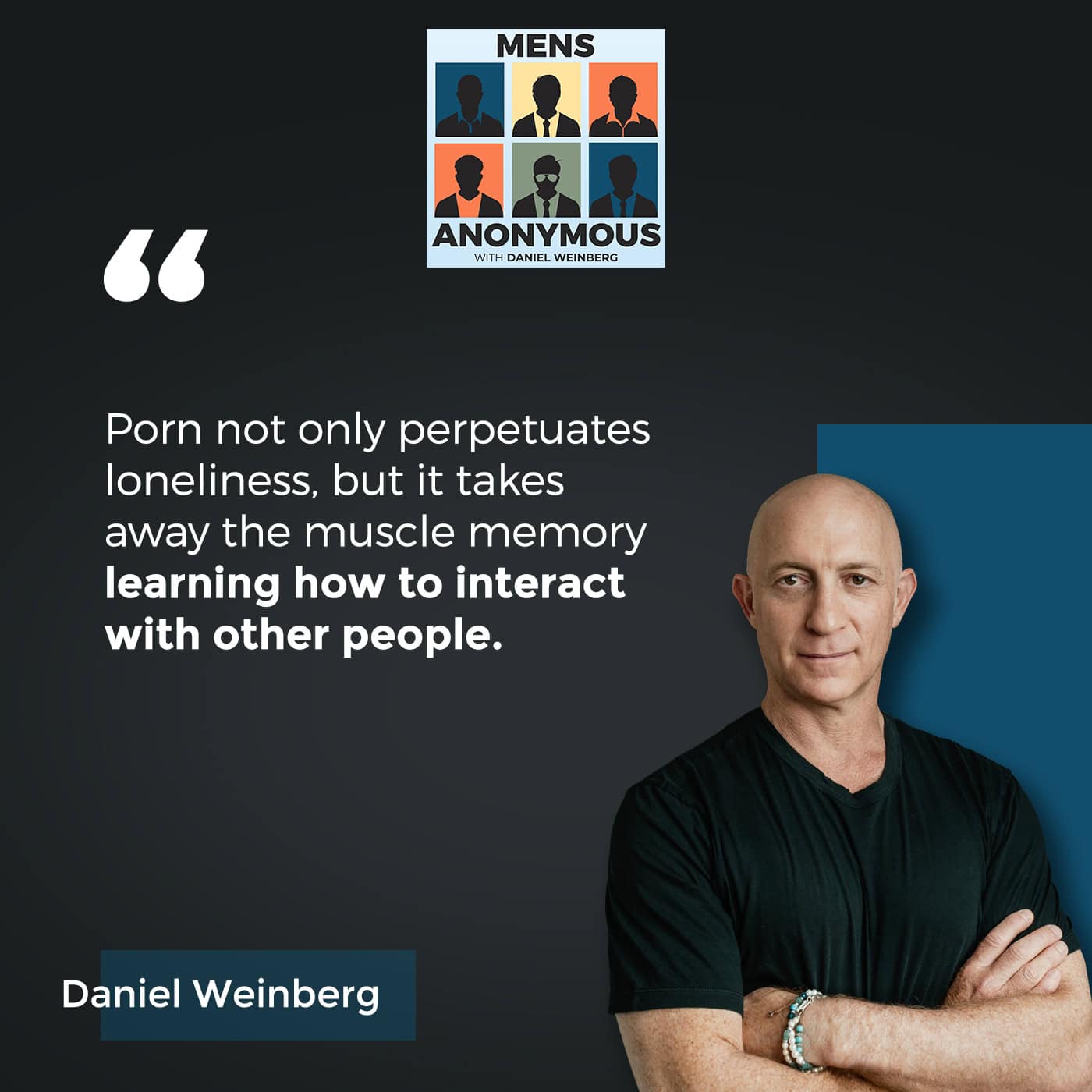
Probably I think being a teenager. In hindsight, I had a lot of incredible men who went out of their way just to be supportive, to guide me. Soccer coaches who would make sure I could get to practice even if it was an hour away and would drive me home. English teachers, history teachers who could sense my genuine curiosity and really help foster that as well as my creative thinking. Some male mentors who took the time to be supportive and loving and guiding. I don’t think I was even able to fully appreciate it at the time, but in hindsight, incredibly grateful.
What did your mother or father teach you that you frequently remind yourself of?
From my dad, probably what you consume through your ears, through your eyes and through what you eat is ultimately going to affect how you show up and what you’re able to produce. My mom, there’s never really an excuse to not tell the truth.
I’ve heard that from my mom as well.
We have some good moms.
What is your superpower?
I think just being able to sit with people in the most uncomfortable and painful moments in their life and offer them unconditional love, not because I’m a guru, not because I’m some know it all with bio hacks or productivity tricks, but just really that I and thou relationship of being able to fully see somebody even when it’s the most painful is probably my superpower.
Luke, an absolute pleasure. Thanks again. We’re going to talk soon.
Sounds great. Thank you, Daniel.
Important Links
About Luke Larkin
 From the first camera phone at 13 to building AI tools that help men reclaim their focus, Luke Larkin has lived both sides of the digital addiction crisis. A med school dropout turned tech founder, he’s spent over 7 years in the trenches of addiction recovery: facilitating CBT, 12-Step, and dialectical behavioral therapy groups, and integrating breath-based nervous system regulation to help men break free from the loop.
From the first camera phone at 13 to building AI tools that help men reclaim their focus, Luke Larkin has lived both sides of the digital addiction crisis. A med school dropout turned tech founder, he’s spent over 7 years in the trenches of addiction recovery: facilitating CBT, 12-Step, and dialectical behavioral therapy groups, and integrating breath-based nervous system regulation to help men break free from the loop.
In this raw, no-BS conversation, Luke and Daniel unpack the hidden costs of dating apps, OnlyFans, and porn – not just to relationships, but to a man’s relationship with himself. Luke shares how COVID accelerated the commodification of intimacy, why blockers alone don’t solve the problem, and how to rebuild a life so rich in purpose that digital crutches lose their appeal.
Today, Luke is the founder of Untethered (untethered.voyage), offering one-on-one coaching for men ready to reclaim presence, purpose, and power, and the creator of HealShield (healshield.org), a free Chrome extension that turns your browser into a mindful ally instead of your biggest trigger.
If you’ve ever felt stuck in compulsive scrolling, swiping, or seeking, this episode will hit you like a cold plunge for your soul.

